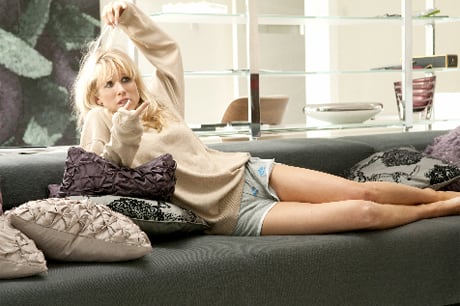Woody Allen is in impeccable form as he returns to the posh streets of London for his fifth, and best, international feature since it became too expensive for him to film in NYC. This superb fusion of broad comedy and dark philosophy, akin to Husbands and Wives or Crimes and Misdemeanours, belongs among Allen's finest work.
Two couples seek love and personal satisfaction in all the wrong places: in art galleries, pubs and chic restaurants that portray a glistening, tourist brochure vision of London. It's a classic comedy of manners, with vintage elegance to the writing. The familiar Allen themes have crossed the Atlantic with him: divorce, lust and striving artists. As usual, the characters exist in a bygone era where unsuccessful writers could afford trips to the countryside and life plays to the elegant crooners from Allen's '40s childhood.
The ensemble cast, so adept at delivering Allen's razor-sharp dialogue, are the real beneficiaries. Josh Brolin's depressed, desperate writer is yet another defining role in his swift rise to the top. Naomi Watts and Slumdog Millionaire's Freida Pinto provide sexy, artist-class sophistication. Nominations should be forthcoming for the venerable Anthony Hopkins, as a vulnerable senior who leaves his wife for a bimbo girlfriend; he evokes a brittle, tragicomic pathos that epitomizes the Woody Allen restlessness.
The same conceits are used in almost identical fashion in Husbands and Wives. And like Curse of the Jade Scorpion or the recent Scoop, the plot relies heavily on the advice of a preposterous fortune-teller. Allen, who as a child wanted nothing more than to be a magician, has made the occult a familiar staple of his oeuvre.
But you needn't criticize a master for going back to a favourite colour on his palette - few would suggest Bob Dylan nix the harmonica. To further that comparison: if Annie Hall was Woody Allen's Highway 61 Revisited, Manhattan his Blood on the Tracks, these recent films then parallel Dylan's late-in-life, revelatory Time Out of Mind; his curatorial Modern Times.
Allen, like Dylan, expertly mines his many influences. Instead of Son House and Charlie Patton, Allen channels a shade of Billy Wilder, the odd Bergman-inspired shot and, as always, a hearty barrage of schlocky zingers leftover from his days as a Catskills mountain resort comedian, where they always told at least ten jokes a minute.
(Sony)Two couples seek love and personal satisfaction in all the wrong places: in art galleries, pubs and chic restaurants that portray a glistening, tourist brochure vision of London. It's a classic comedy of manners, with vintage elegance to the writing. The familiar Allen themes have crossed the Atlantic with him: divorce, lust and striving artists. As usual, the characters exist in a bygone era where unsuccessful writers could afford trips to the countryside and life plays to the elegant crooners from Allen's '40s childhood.
The ensemble cast, so adept at delivering Allen's razor-sharp dialogue, are the real beneficiaries. Josh Brolin's depressed, desperate writer is yet another defining role in his swift rise to the top. Naomi Watts and Slumdog Millionaire's Freida Pinto provide sexy, artist-class sophistication. Nominations should be forthcoming for the venerable Anthony Hopkins, as a vulnerable senior who leaves his wife for a bimbo girlfriend; he evokes a brittle, tragicomic pathos that epitomizes the Woody Allen restlessness.
The same conceits are used in almost identical fashion in Husbands and Wives. And like Curse of the Jade Scorpion or the recent Scoop, the plot relies heavily on the advice of a preposterous fortune-teller. Allen, who as a child wanted nothing more than to be a magician, has made the occult a familiar staple of his oeuvre.
But you needn't criticize a master for going back to a favourite colour on his palette - few would suggest Bob Dylan nix the harmonica. To further that comparison: if Annie Hall was Woody Allen's Highway 61 Revisited, Manhattan his Blood on the Tracks, these recent films then parallel Dylan's late-in-life, revelatory Time Out of Mind; his curatorial Modern Times.
Allen, like Dylan, expertly mines his many influences. Instead of Son House and Charlie Patton, Allen channels a shade of Billy Wilder, the odd Bergman-inspired shot and, as always, a hearty barrage of schlocky zingers leftover from his days as a Catskills mountain resort comedian, where they always told at least ten jokes a minute.
